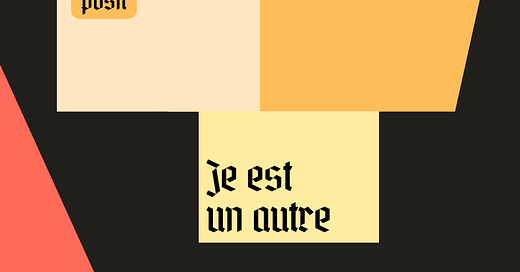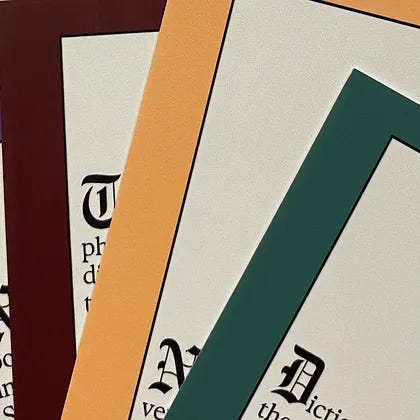Open Letter to All and Sundry
One year of COM-POSIT | Authenticity–inauthenticity | "I am already another" | Smuggling time | Line of flight | Systole, diastole
Addendum: I’m sending out this piece from a hospital bed, of all places. In a way, as I think becomes clear later, this is a fitting reprisal, though I have to admit, I would really prefer to be elsewhere. – Z
The first thing you may notice about this piece is that, further down below, it is (partially) paywalled. But I hope this in-itself doesn’t deter anyone. The free part, self-contained enough, is addressed to you just as much as this partially occluded, and yet accessible, second part.
I’ve been writing COM-POSIT for a full year now. When I began, I had very few readers, and my commitment to publishing regularly was one I made purely to myself (and to writing as such).
I had decided that Substack, of which I always felt curious but distrustful, would be a good way to take the publishing aspect of writing less seriously. Before COM-POSIT (and alongside it), I had had work appear in journals and reviews for several years. But I wanted to attempt a pace that had an actual parallel with that of my own writing.
After making good on that commitment to myself for a full year (without fail, I should add), I now have a wider base of readers.
To be honest, it’s an exciting situation to find myself in. The idea that a handful of people do in fact read my work, even passively—while sitting on the toilet or over their morning coffee—never loses its novelty, never ceases to be strange. But a thousand people? This otherwise comprehensible quantity becomes nearly incomprehensible to me in this context. (And of course, for this, I thank each one of you personally.)
So, my commitment to publishing on a regular basis becomes a commitment not only to myself but to the continuing quality of what I put out, as well as to the reader.
Here is something else strange that I have come to realize: This thought of an audience, of any kind of readership at all, does not make it any more difficult for me to say what I want to say.
I have known people who clam up the moment they have an audience, even a relatively small one—or an imaginary one. It’s disconcerting to see happen; to watch this person for whom writing or art is significant freeze just when they imagine that there is some alien factor of pressure, an expectation to produce, as if the audience, real or imagined, was, in a terrible reversal, forcing them into their creativity.
This makes me very sad. In a sense, it is an illusion, a spook of the mind or of a person’s image of themselves.
Anyone who has ever corrected a spelling mistake or a choice of wording in their own diary is aware of this conundrum. “Who am I correcting this for?” The pitfall that opens up at this juncture is that of fetishizing an unanalyzed notion of authenticity. One somehow believes that only the private sphere of life is conducive to being oneself “for real” and that doing something with others in mind (whatever this mean) sullies it, exposes it to the dangers of inauthenticity—as if that were something to be avoided at all costs, even at the price of giving up writing, giving up painting, giving up music, and so on. But the authenticity–inauthenticity polarity, or the field generated by that polarity, is a dubious one that can only be gone through, traversed, rather than side-stepped.
The idea that privacy is the only domain of authenticity is basically anti-social; at its most extreme, this notion also belongs to a certain kind of apolitical, solipsistic subjectivity, which says, “Everything within me is perfect until ruined by the gaze of others.” This seems like a very common perspective. But, as Proust says, “our social personality is created by the thoughts of other people.”
The caveat that rounds this off is that we ourselves are also always already “other people”, and that this intellectual multiplication of ourselves in others begins with us.
Naturally, I wondered a little if I would also clam up at the mere possibility that a set of eyes other than my own would read what I had written, unmediated by a first round of submission-readers, editors and the firm pages and typesetting of a publication.
“Naturally,” fine: but completely wrong-headed. The difficulty lies only with oneself. Hell is not other people; Hell is yourself.
When Walter Benjamin—who you’ll be able to tell, by now, is a constant presence in what I write1—when he says that “No poem is intended for the reader, no picture for the beholder, no symphony for the audience[,]” I do not also understand this to mean that you must totally ignore the idea (but only the mere idea) that others will read your work. Just the opposite:
Once you have written anything, it is already as good as read.
Je est un autre. I am already another.
Do you really believe that somewhere inside you, like a cluster of koi fish sealed-away in a pond, there are some words swimming around in the form of secret sentences that, by doubling on paper, you are dangerously exposing to the air in the form of writing? What goes on, I am convinced, is far more mysterious than that. It doesn’t mean there aren’t koi fish in the pond, so to speak, but when you write—as when you paint, as when you compose, as when you translate—it is more like turning the space around you into a pond where everything that was already there begins to swim.
Writing, no matter the metaphors people use, myself included, is an externality. I see it in front of me now, words which I could no more say that they came from within me than that they came from within you.
As there seems to be no sign of letting up, and because I devote a significant amount of time and work to this strange, externally banal mystery of writing one thing rather than nothing, or of writing some things rather than others, I have decided it’s right that I should try to support myself—if only partially, precariously, minimally, like a clown standing on two rickety chairs, just about to fall—with what else but this very writing.
Thus a paid version of COM-POSIT. There will still be free pieces published every month, but, to invert an otherwise great piece of wisdom,
Man does not live by the Word alone, but also by bread.
As I’m sure you’ve seen, I am sending out copies of a special piece called “Night is a Dictionary”. It’s a rewritten little cluster of aphorisms from a much longer essay called “The Exterminating Angel” (which I may also post here), plus a piece of flash fiction that I wrote while I was living in Vienna. It’s on five cards that can be shuffled around and read in any order.
They can be re-used as postcards. I’m sure they’d make good coasters.
It comes with a paid subscription, along with the rest of this piece you’re reading now, and much more to come.
Keep reading with a 7-day free trial
Subscribe to COM-POSIT to keep reading this post and get 7 days of free access to the full post archives.





